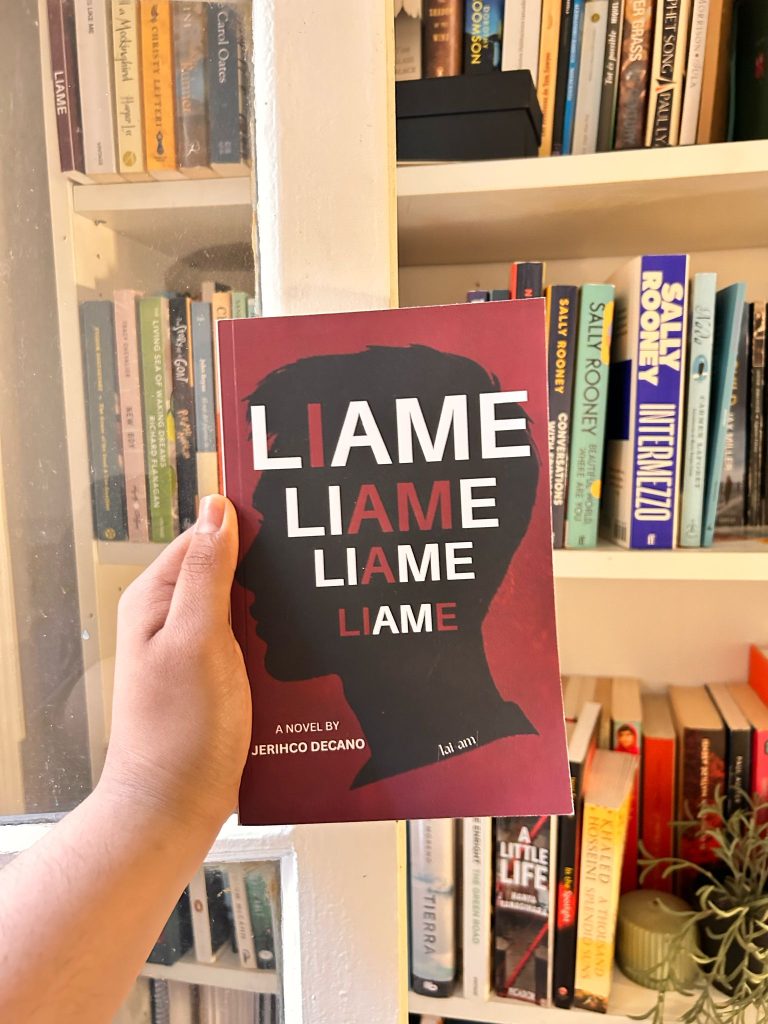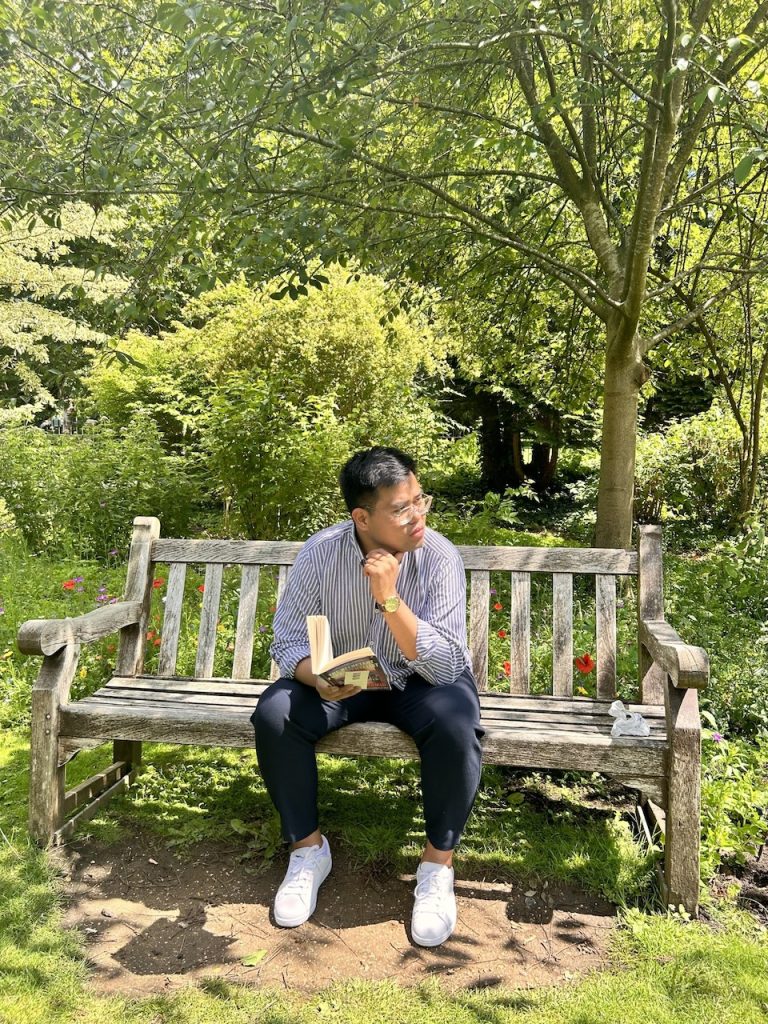Jerihco Decano’s Liame

Barcelona-based Pinoy writer Jerihco Decano shares with TFEM his thoughts on his new book and how his life in Spain inspired him to write his first novel, Liame.

TFEM: What inspired you to write Liame?
JD: We, humans are narrative creatures. We love listening, reading, and crafting stories. It’s what makes us who we are. We are stories. And yet, I’ve noticed that over time, we tend to focus mostly on what is being told —the events, the plot, the drama— while overlooking who is telling the story. This realization is what inspired me to write this novel. I wanted to bring equal attention to the story and the storyteller. Because behind every narrative is a voice, a perspective, a life worth noticing. Also, there’s very little representation of Filipinos. We’re often cast in stereotypical roles. We deserve more than the margins. We deserve to be at the center of the story. I want to create Filipino characters who are complex, vibrant, and fully human. Characters who reflect the language, struggles, and rich culture of the Philippines. Characters who lead.
TFEM: What are some of Liame´s defining traits, motivations, and perhaps even his inner contradictions?
JD: Liame is Filipino, in his early twenties, a scholar, and is about to finish his degree in English Studies. This indicates that he is deeply interested in literature, the power of words and language, history, and culture. Moreover, he is highly intellectual and has a thirst for knowledge. He has a routine of researching random topics, especially those related to his roots, his country, and the elements that make a Filipino a Filipino. As for his inner contradictions, it is very important to note that Liame writes two versions of his life. What he tells in one notebook, he deconstructs and challenges in the other.
TFEM: Moving from poetry to a novel is a significant shift. What drew you to the longer narrative form?
JD: Even though I published a poetry book first, I’d always wanted to write prose—a longer narrative. I remember two occasions during my degree when we were given a choice for an assignment: to write a poem or a short story. And both times, I chose the narrative. My passion for poetry and narrative go hand in hand—they influence and enrich each other. And perhaps, even though this novel is written in prose, the presence of the poetic voice, my poetic voice, is still very much there.

TFEM: Why does daydreaming play a significant role in your book?
JD: Dreaming, especially daydreaming reveals a lot about how we want to escape reality, to run away from real life, from our physicality. For some, it is one of the many repercussions of what life they’ve had and they were having, mostly traumatic. Perhaps that unveils something about Liame. Does he daydream or was he just remembering the past? If he daydreams, for what purpose? Is it an obvious indicator of what happened to his life?
TFEM: Do you daydream?
JD: I’ve been repeatedly asked whether I daydream or not, and my answer is always the same: I don’t. Daydreaming is that moment when our minds wander beyond the immediate, into a space of “what ifs.” It’s the mind trying to fill in gaps or escape something unspoken. But for me, I rarely feel the need for it. Maybe I’m already living my own story, in the present, and the need to escape through daydreams just doesn’t quite fit.
TFEM: What led you to choose English as the language for this particular story?
JD: There are several factors that led me to write in the English language. I majored in English—its history, culture, and structure. I studied the intricacies of this powerful tongue, its evolution through time, and in my professional life, I teach and mostly communicate in English. As a writer, you also want your work to reach as many readers as possible. And for all these reasons, English felt like the most fitting language in which to write my novel. That said, it’s also true that I’ve woven in a significant number of words from Filipino, Iloko, Spanish, and Catalan—languages that reflect my own story and cultural reality.
TFEM: What kind of emotional or intellectual journey do you hope readers will experience while reading your book?
JD: This novel is a game, I dare say. It plays with your focus as a reader—how closely you pay attention to detail, interpret what is said, perceive truth. It also challenges the reader´s ability to stay with Liame through his stream of consciousness, especially in the first notebook. You might get bored. You might get lost. But that, I believe, is part of the game, part of the experience. You have to reach the end in order to form a valid opinion of the book.
I invite the readers to pay close attention to how Liame expresses what he truly feels in the second notebook. There’s a depth you’ll encounter, and I hope it helps you understand why he created two conflicting versions of his life. If the reader finishes this book with more questions than answers, then he has been a successful reader.

TFEM: Could you share some pivotal moments on your journey of adapting to a new culture in Barcelona while maintaining your Filipino heritage?
JD: I was uprooted at the age of 13, right in the middle of the psychological, mental, and physical changes that are so common in the teenage years. There’s an event in my life that, had it played out differently, might have made me a completely different person. When I started studying here, in 3rd ESO, I was utterly frustrated. I couldn’t present myself properly, I couldn’t make out what the other kids were saying, and I struggled to follow the explanations teachers gave on important topics in their subjects. I had no tools, no means of communication or self-expression, apart from English—which was also a struggle. Back then, not many kids, especially not public school kids, knew English. I went from being an active student, participating in class and getting good marks, to becoming almost mute and inactive. It was heartbreaking, especially because I didn’t have anyone to turn to for help. My parents and siblings tried to help me with the Spanish they knew, but it wasn’t enough. Eventually, I reached a point where I told my parents I was no longer interested in finishing high school and would rather work. But they convinced me to persevere, reminding me that it was difficult simply because I was new. Just imagine if I had stopped. Looking back at those years, and comparing them to where I am now, I realize that phase of my life is something I must treasure. It’s a part of me that’s worth sharing.
TFEM: What key similarities and intentional differences exist between you and Liame?
JD: It’s funny how the first people who read the book look at me with a fixed, scrutinizing gaze and ask me whether it’s my story. I always tell them it’s not. There are instances though where Liame and I share similarities—both scholars, both bookworms, both having studied Filologia Anglesa (English Studies), and both introspective. Some events in his life are versions of what actually happened in my childhood. But as for the differences, that’s where something Liame mentions in the second notebook comes in. It’s something that will change how you view the first notebook. That’s the key that sets us apart.

TFEM: Drawing from your own journey as a Filipino writer living abroad, what piece of advice would you offer to other aspiring writers from the Philippines navigating a similar path?
JD: There is so much more to explore than just romance and love stories. Enough with the love tandems. We need to showcase what Filipinos truly offer: our culture, our language, and our creativity. As writers, you must set a goal to dig deeper, read more, and write narratives that can change not only a nation but the entire world. Focus on stories that go beyond the romantic relationships between a boy and a girl. There is a world of richness out there that is waiting to be told.
TFEM: As a second-generation immigrant, how has your Filipino identity shaped your sense of self and your worldview, particularly in the context of living in Barcelona?
JD: Perseverance, diligence, and respect are traits deeply ingrained in most Filipinos. They are etched within us. My parents and the education I received in the Philippines emphasized these characteristics, and they have been essential in helping me get to where I am today. Without perseverance, I wouldn’t have completed not just my degree, but also ESO and Batxillerat. However, perseverance without diligence and respect is futile. They are all interconnected. Growing up using “po” and “opo,” and treating the elderly with respect, helped me understand others and approach them with politeness—especially when faced with mistreatment.
TFEM: What makes Liame a worthwhile read?
JD: Liame offers glimpses into Filipino culture and the diaspora experience. The narrators use Filipino words, incorporate Iloko poetry, and introduce elements of Philippine symbolism. The novel also highlights the work of Felix Hidalgo, a Filipino painter who earned recognition abroad but did not receive enough appreciation in the Philippines.
This novel challenges readers to question everything they are presented with. How much of the Philippine history we’ve been taught is truly accurate? My goal is to plant a seed of doubt, encouraging my readers, especially Filipinos, to question popular history and the singular, often simplified, narratives we’ve been handed.
What's Your Reaction?
Nats Sisma Villaluna has been serving the Filipino community in Spain for more than 17 years. His volunteer works include teaching Spanish to Filipinos, and as artistic director of the Coro Kudyapi, a group of musically inclined young Filipinos in Barcelona. His passion to serve the Filipino community now extends to other countries in his role as Publisher and Editor-in-Chief of the new The Filipino Expat Magazine.



